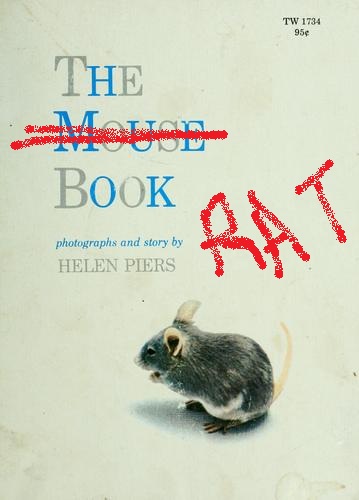Normal
0
false
false
false
EN-US
X-NONE
X-NONE
/* Style Definitions */
table.MsoNormalTable
{mso-style-name:"Table Normal";
mso-tstyle-rowband-size:0;
mso-tstyle-colband-size:0;
mso-style-noshow:yes;
mso-style-priority:99;
mso-style-parent:"";
mso-padding-alt:0in 5.4pt 0in 5.4pt;
mso-para-margin:0in;
mso-para-margin-bottom:.0001pt;
line-height:115%;
mso-pagination:widow-orphan;
font-size:12.0pt;
mso-bidi-font-size:11.0pt;
font-family:"Times New Roman","serif";
mso-bidi-font-family:"Times New Roman";
mso-bidi-theme-font:minor-bidi;}

Two weeks ago, we introduced the Book Rat Project, a sustained experiment in which a book critic (me) will attempt to act as a human algorithm for a willing subject (my Phoenix colleague Will Delman)
who, for the duration of the project, will read everything I tell him
to. After submitting the subject to a brief, worthy questionnaire, and analyzing his review of The Rook by Daniel O'Malley, a book he told himself, I gave him his first assignment: The Orphan Master's Son by Adam Johnson. Here's his take:

I'd heard a ton about
The Orphan Master's Son before Eugenia sent it my way. Most of the
conversations had centered on how brilliant it was, how Johnson had created a
literary/espionage hybrid of rare and admirable genius. I was skeptical after the
numerous "This great book meet this great book" jacket blurbs scrawled all over
The Rook. But I'm always willing to give a genre-bender a shot.
The Orphan Master's
Son didn't disappoint,
though it did send me running to Wikipedia more than once. Who knew there used
to be a port where North Koreans could land in Japan for daytrips, or that
North Korea use to routinely kidnap Japanese civilians? In an odd moment, I
realized I'd had an easier time suspending my disbelief for the super-powered bureaucrats
and vampires of The Rook, but that's how unreal North Korea is: it's the
Nation State equivalent of Fox News.
Things that worked
for me: this is a novel of big, if not new, ideas. Johnson is obsessed with the
way a fiction can craft, govern, shape, save and take a life, and this is
something I spend a lot of time thinking about myself. As someone that works
for a newspaper, and a relentless consumer of news in general, there's always
that awareness that I'm getting a version of the truth that's being presented
as the truth. This is an easy and dangerous fact to forget (see: Iraq). Also, despite some jarring shifts, the narrative is well-crafted. The
Orphan Master's Son a rare animal indeed: a page turner that kept me
thinking even in my sleep.
Problems: If this
book has a serious flaw it's that the characters often feel like a chorus
espousing the ideas and recounting the events that drive the story. Admittedly,
this is a tale of people trying to reclaim their humanity from the fictions
forced on them, but a lack of sustained internal reflections mutes this theme,
and makes it too easy to get lost in the scenes of torture and violence that
comprise so much of the book. There's also a rough patch about two hundred
pages in where the narrative structure undergoes a jarring shift. It wasn't
enough to stop this reader, but I can see how others might suddenly find
themselves disinclined to continue reading.
But they should. For
all its problems this really is a wonderful read. Beautiful, tragic, worldly,
violent, funny, ridiculous and brutal, The Orphan Master's Son does an
admirable job of combining the intellectual energy of China Mieville's The
City and The City with the tragic-comic genius of Slaughterhouse Five.
While it might not manage to equal either, this is an eminently enjoyable,
perhaps even important novel, about the way countless lives can be destroyed by
a myth.
The Book Rat letter
grade: B+
----------------
From this review, I've hypothesized the following about the subject's taste preferences:
- The subject likes books that tackle big ideas
- The subject doesn't much care for ultraviolence
- The subject likes strong characterizations
Based
on these hypotheses, I'm forcing the subject to
read By Blood by Ellen Ullman. Ullman, a vanguard computer programmer / acclaimed novelist and memoirist has written her third novel, a book about a San Francisco college professor, a psychologist, and her patient. By Blood is a character-driven novel with big ideas (genocide, identity). Check next week for a full review, and follow the Book Rat's daily updates on Twitter.
















